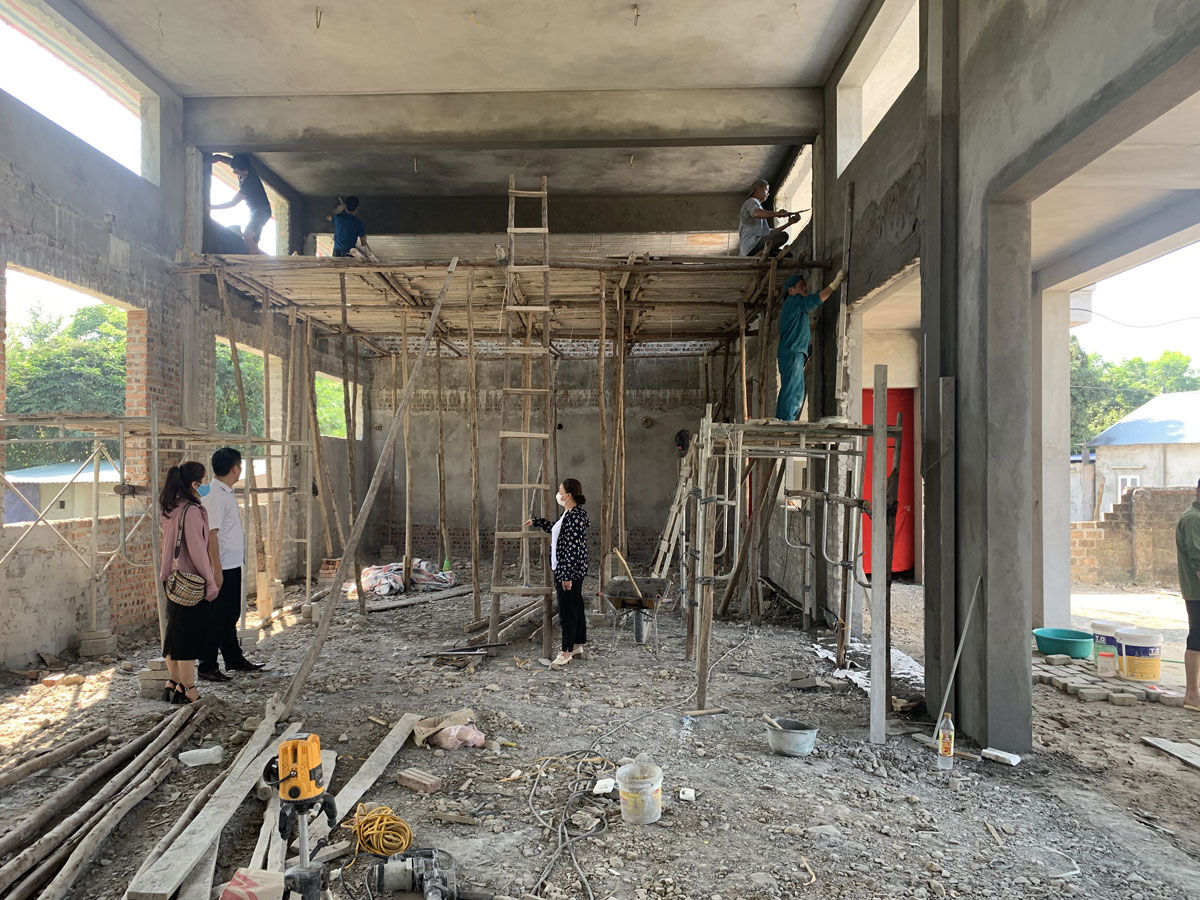
(HBO) – The grassroots culture institution system has been upgraded in Luong Son district, which has reached the target of new-style rural area building, contributing to improving people’s cultural and spiritual life.
Culture house in Coi
hamlet, Tan Vinh commune, Luong Son district, will be completed soon.
The construction of the culture houses in Coi and Dong Tien hamlets, Tan Vinh
commune, which began earlier this year, is being wrapped up. Covering 275sq.m,
the house in Coi hamlet is designed to accommodate up to 300 people, with a
total investment of 2 billion VND sourced from the State budget and
contributions by local residents.
The house is a venue for not only political events but also cultural, art and
sports exchanges of locals.
Over the past years, Tan Vinh has been known for its cultural, art and sports
movements, and taken the lead in this regard, which is attributable to the
culture institutions.
Vice Chairman of the communal People’s Committee Hoang Anh Vuong said Tan Vinh
has a culture house and all of its six hamlets have their own fully-equipped
ones.
The maintenance and development of cultural infrastructure have contributed to
creating public consensus during the implementation of socio-economic tasks in
the locality. All of the 146 hamlets and residential areas in Luong Son have
such facilities and sports centres.
Vu Xuan Long, deputy head of the district Culture-Sports Office, said there are
also stadiums at industrial parks, stressing the need to build bigger culture
establishments to meet increasing demand of locals.
The year 2022 marks the district-level Sports Games, with all of the 11 units
completing the organisation of the commune-level events , according to the
official.
Grassroots culture and sports establishments have been upgraded and built,
contributing to promoting the movement to build cultural life in Luong Son,
improving people’s cultural and spiritual life and spurring socio-economic
development./.
With an increasingly vibrant and widespread emulation movement aimed at building cultured residential areas and cultured families, Yen Thuy District has been making steady progress toward improving both the material and spiritual well-being of its people, while fostering a civilized, prosperous, beautiful, and progressive community.
Once lacking recreational spaces and community facilities, Residential Group 2 in Quynh Lam Ward (Hoa Binh City) has recently received attention for the construction of a new, spacious, and fully equipped cultural house. The project followed the model of state support combined with public contributions in both labor and funding.
The "All people unite to build cultural life" movement, which has been effectively integrated with Kim Boi district’s socio-economic development goals, is fostering a lively spirit of emulation across local residential areas, hamlets, villages, public agencies, and enterprises. In addition, through the initiative, traditional cultural values are being preserved and promoted, while community solidarity and mutual support in poverty reduction and economic development are being strengthened.
A working delegation of the Hoa Binh provincial People’s Committee led by its Permanent Vice Chairman Nguyen Van Toan on June 11 inspected the progress of a project to build the Mo Muong Cultural Heritage Conservation Space linked to tourism services in Hop Phong commune, Cao Phong district.
Born and growing in the heroic land of Muong Dong, Dinh Thi Kieu Dung, a resident in Bo town of Kim Boi district, in her childhood was nurtured by the sweet lullabies of her grandmother and mother. These melodies deeply imprinted on her soul, becoming an inseparable part of her love for her ethnic group's culture. For over 20 years, this love for her hometown has driven Dung to research, collect, and pass down the cultural values of the Muong people to future generations.
In the final days of May, the Ethnic Art Troupe of Hoa Binh Province organized performances to serve the people in remote, mountainous, and particularly disadvantaged areas within the province. These were not just ordinary artistic shows, but they were the meaningful journeys aimed at spreading cultural values, enhancing the spiritual life of the people and contributing to the preservation of ethnic minority cultural identities.



